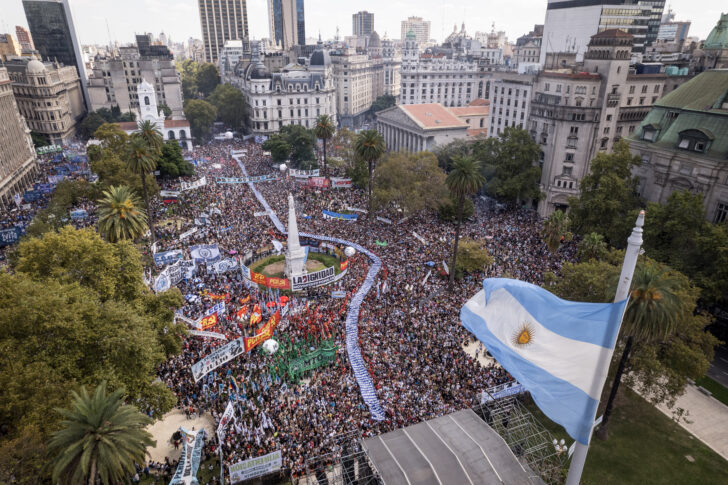On Sunday, March 24, we commemorated the 48th anniversary of the coup in Argentina. As with every anniversary, hundreds of thousands of people took to the streets and squares on occasion of the Day of Remembrance to reject the systematic plan of disappearance, torture, and extermination that was implemented then and continues to be investigated and prosecuted to this day. However, this anniversary finds us in an unprecedented context, which challenges us to once again to reaffirm a pact in defense of democracy.
Javier Milei’s government vindicates the criminal plan of the armed forces carried out during the 1970s. By doing so, it seeks to downplay the fact that people were thrown alive into the sea from airplanes, children were kidnapped, and mass disappearances and torture took place. But it is not just an attempt to rewrite history and deny these crimes; it also aims to legitimize his policies in the present.
The military encroachment on civilian areas of the government is significant. We observe a resurgence of military sectors in Argentine political life with a level of participation that until now had been restricted under a consensual agreement among successive governments, different political parties, and a large part of the Armed Forces. Specifically, retired military personnel hold numerous political positions that, over these 40 years of democracy, were occupied by civilians. In some cases, these functions undermine the demarcation between national defense and internal security, as the government has placed military personnel in positions related to national intelligence or crime prevention. Other officials and lawmakers are civilians, but they see themselves as part of “the big military family” and represent those interests. Together with the Political Investigation Team (Edipo) of Revista Crisis, we have mapped out the political landscape of Javier Milei’s government.
Similarly, faced with the serious increase in violence associated with drug trafficking, the government is moving toward militarizing security policy under the guise of a supposed war on terrorism. Defense Minister Luis Petri stated that there is a common thread between the repression of the 1970s and the intervention that the state should now pursue in the city of Rosario, province of Santa Fe. This statement does nothing but legitimize the illegal violence of the state and vindicate the dictatorship to justify the use of the Armed Forces in the “war on drugs.” The only thread connecting both is illegal state violence, as evidenced by serious reports of torture in Santa Fe prisons.
On the occasion of the 67th session in Vienna of the United Nations Commission on Narcotic Drugs (CND), we raise concerns about the serious consequences of militarization and states of emergency in response to the emergence of organized crime. With the support of the United Nations High Commissioner for Human Rights, we convened a panel to analyze that, as evidenced by the case of Ecuador, militarized responses, and declarations of states of emergency have no chance of solving the problems of organized crime, violence in the territories, or problematic substance use. It is imperative to foster serious debates so that states can find solutions to these problems rather than exacerbating them.
In essence, the official discourse echoes and reinterprets the guiding principles of the dictatorship. The idea that it is necessary to sacrifice rights and democratic institutions in order for someone to impose order is also gaining traction. We addressed this issue in an article published in Folha de Sao Paulo.
Ph: CELS Argentina

